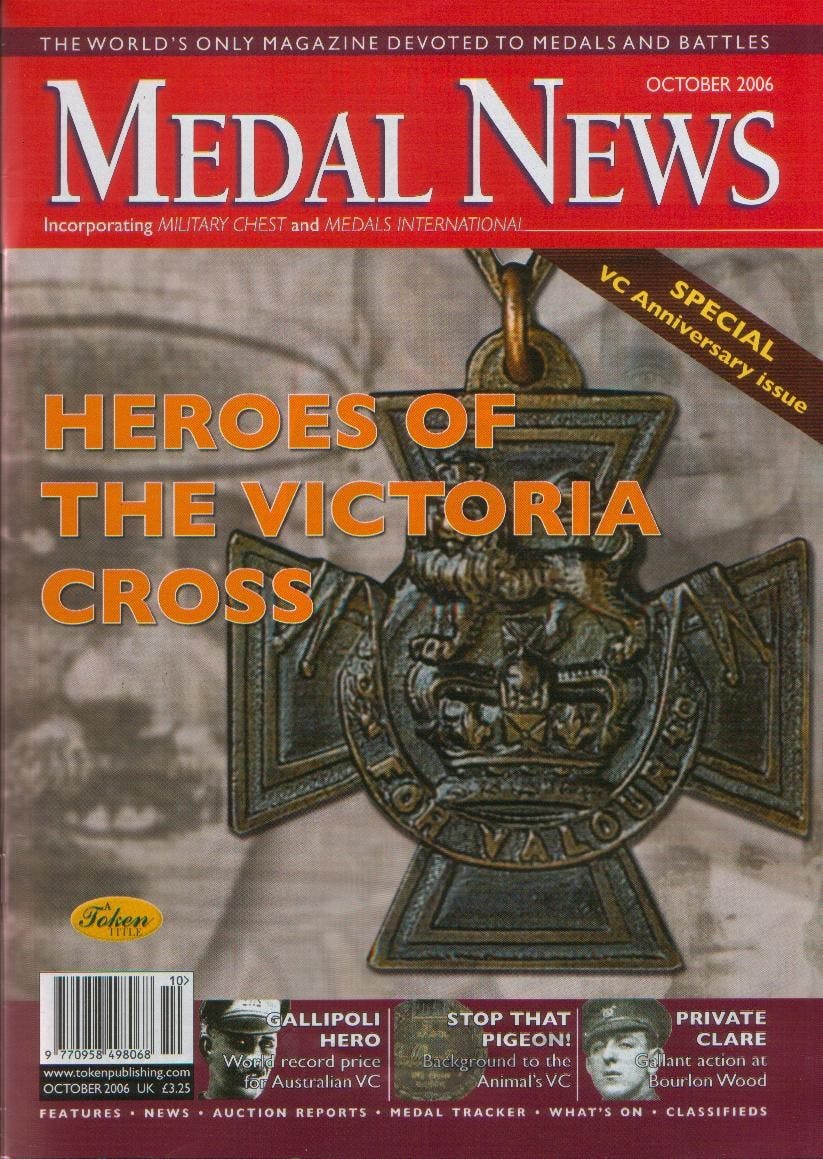150 years of valour - NO LONGER AVAILABLE
Volume 44, Number 9, October 2006
When Queen Victoria signed the Royal Warrant instituting the award of the Victoria Cross her idea was to create an award that would transcend all barriers of class, rank, social standing etc and recognise bravery in the face of the enemy for what it was – an often selfless, frequently fatal, act that could be carried out by the lowliest boy soldier or sailor just as assuredly as by the loftiest commander. At the time of the VC’s institution and in the succeeding years the British Empire was expanding as never before and frequently it was expanding at the point of a bayonet. Her Majesty’s forces were in action across the globe, in Africa, in the Crimea, in Asia, in Europe, in the Indian sub-continent, in North America, even in New Zealand the British army and Navy were everywhere and, inevitably, there was a price to be paid. That price – the lives of those who served - was offset to some degree with the award of medals, odd as it seems today those badges of service and acknowledgements of bravery, which most men wore with great pride, did go some way to “making up” for the fact you might not make it back. However it was the way of the world that the officers seemed to receive more medals than the men and even in cases where the men were honoured their “gongs” were somewhat less illustrious than those of their Commanders. The Victoria Cross sought to do away with that, recognising as it did the fact that a brave man was a brave man regardless of his social standing. Of course these ideals might not always have been adhered to quite as stringently as Queen Victoria may have wished and there is no doubt that some awards, particularly those to certain senior officers have been somewhat controversial and likewise little doubt that some men have not been rewarded in quite the way they should have been (either because an Officer was not present to witness their act of bravery or perhaps because they weren’t exactly in the CO’s good books!) but in the main the 1,355 awards made have all been done so in the true “classless” spirit first intended and that, coupled with the actual acts of heroism necessary to earn such a decoration have made it the most talked about, written about and discussed medal in history. The Victoria Cross is far more than a simple bravery award, it is in itself a romantic ideal – even the metal it is made from has a history and romance all of its own! Every award ever made has been examined and re-examined, and over the years scholars, historians and academics have ceaselessly debated the whys and wherefores of every action, every incident in which a Cross was won. Military tacticians have argued endlessly over the impact the recipient’s actions had on the wider battle, the war, his comrades etc etc and the more cynical have been frequently heard to ask just why was each award made? What were the political implications behind it? Even today these debates still rage – you only have to look at the award of the VC to Col “H” Jones during the Falklands conflict - an award that was discussed and argued over at great length and the more recent award to Pte Beharry. This decoration in particular seems to have brought out the cynics in force, with the fact that the recipient was from Grenada and one of the “minorities” represented in the British army today leading to some insisting that the bestowal of the Cross was more politically motivated than anything else; hardly fair on a soldier who twice laid his life on the line to help his comrades but, rather sadly, it’s very much in the spirit of cynicism that has often surrounded the nation’s highest award for bravery! Critics and criticism aside there is no doubt that the Victoria Cross and all it represents still holds a very special place in the Nation’s heart (indeed the hearts of all nations who still hold it, or their own version as the highest military honour – you only have to look at the price paid for Shout’s VC in Sydney recently to realise that) and this year, the decoration’s150th anniversary, has seen more interest generated in the medal and its origins than ever before. There have been commemorative stamps and coins, numerous new books, a major television series and now the news that Lord Ashcroft’s stunning collection of no fewer that 142 Crosses will soon be available for the nation to enjoy. As medal collectors we may never own a Victoria Cross (much as we may like to) but we, like so many others, seem to never grow tired of reading about them and the men that earned them – with this in mind we hope you will like the humble offerings we bring you this month in our special VC edition – and look out for more news on Lord Ashcroft’s new book and his collection in coming issues.
Order Back Issue
You can order this item as a back issue, simply click the button below to add it to your shopping basket.

